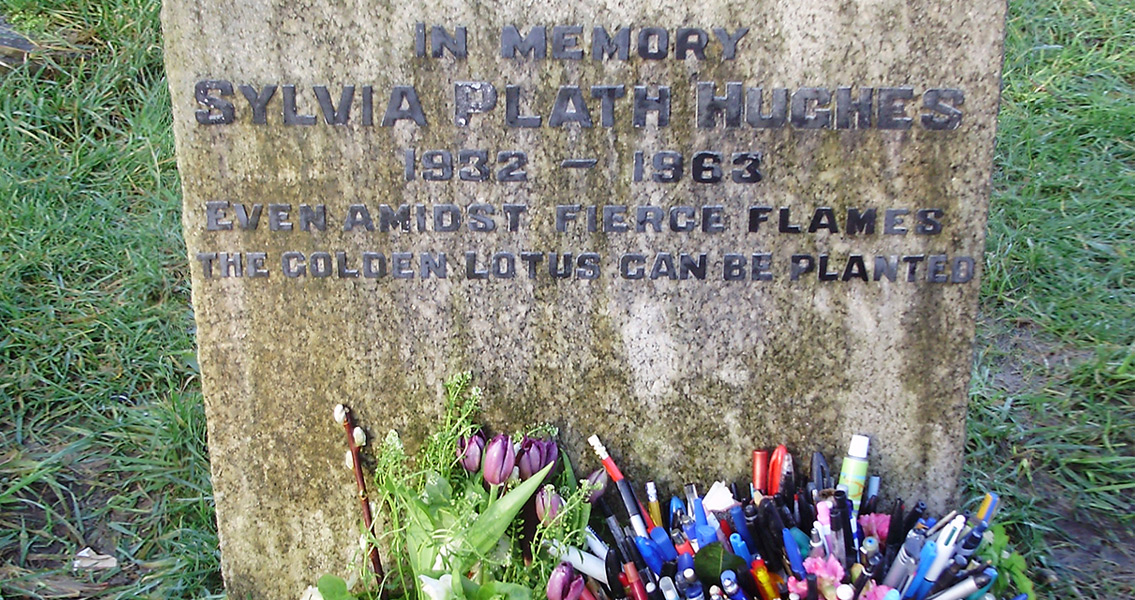<![CDATA[On the 25th February 1956 Ted Hughes and Sylvia Plath met for the first time. The meeting signaled the start of a relationship which would be both romantic and volatile, inspiring creativity among the two writers but ending in terrible tragedy. The occasion for the meeting was a literary party in Cambridge, held to celebrate the publication of the first issue of St. Botolph's Review. At this point, Plath was a student at Cambridge University, studying as part of a Fulbright Scholarship. Hughes was a Cambridge graduate working in London. Four months after their steamy first encounter, Hughes and Plath were married. Plath was born in Boston, Massachusetts, in 1932. Her father, a German living in America named Otto Plath, was a biology professor at Boston University. Otto was a strict, authoritarian father, which inevitably had a significant impact on Plath's poetry, as did his death in 1940 from complications linked to diabetes. Otto's death left the entire burden of raising his family on the shoulders of his wife Aurelia, who was forced to gain full time employment as a teacher to support her two children. Throughout her youth and adolescence, Plath demonstrated the two characteristics of her personality which would play a huge role in her life. From the age of eleven she kept a diary, and started to have her poems published in local newspapers and magazines. In 1950 she enrolled at Smith College, where she suffered a severe bout of depression and attempted to take her own life. Nevertheless, she overcame the mental distress and graduated in 1953, before embarking on the Fulbright scholarship that eventually bought her to England. Ted Hughes was born in Mytholmroyd, West Yorkshire, in 1930. Raised in the countryside, the Yorkshire Moors would come to influence his poetry for much of his life. After completing high school, Hughes enrolled in the Royal Airforce for two years, before starting his degree at Pembroke College, Cambridge. After graduating, he co-founded the St. Botolph's Review literary journal, which brought him to the party in 1956. Following their marriage the couple moved to Plath's hometown of Boston, where the two taught at the University of Massachusetts. The marriage also saw the two poets establish their careers, with both having poetry collections published. In 1959 Hughes won a Guggenheim scholarship, and the couple returned to England. They also had their first child in 1959, with a second following two years later. The final years of their relationship, and ultimately Plath's life, have since been dissected and analysed in excruciating detail. In 1962, Hughes left Plath for Assia Gutmann Wevill. Details of the affair are of course not totally clear, although judging from Wevill's accounts, it seems Hughes' infidelity had started before he left Plath. Many critics of Hughes argue that his actions towards the end of the relationship humiliated Plath, and caused her great mental distress. Plath moved to London in the freezing winter of 1962. The period seemed to inspire a burst of productivity from her, as she wrote some of her most popular poems, as well as her debut novel, the Bell Jar. Tragically, the period also coincided with a return of her depression. In February 1963 she killed herself, she was aged 30. Following Plath's death, Hughes retained responsibility for her estate, thanks to their divorce having not been finalised. Hughes organised the posthumous publication of several of her works, including 'Collected Poems', which won the Pulitzer Prize in 1982. However, Hughes also caused controversy after publicly admitting he had destroyed several of Plath's journals and notebooks. This admission led to criticism from academics, who claimed that it had prevented a true appreciation of the writer's work. For others, it added substance to the belief that Hughes had information relating to the relationship between him and his estranged wife in the years before her death, that he wished to conceal. The relationship started on 25th February 1956 between Hughes and Plath was an intriguing and ultimately tragic one. The works, and to some extent the personalities, of both poets will live on through their published material. The continued interest in their work and history reveals just how fascinating their writings were, as well as their life stories. Image courtesy of Wikimedia commons user: Jprw]]>
Sylvia Plath Meets Ted Hughes
